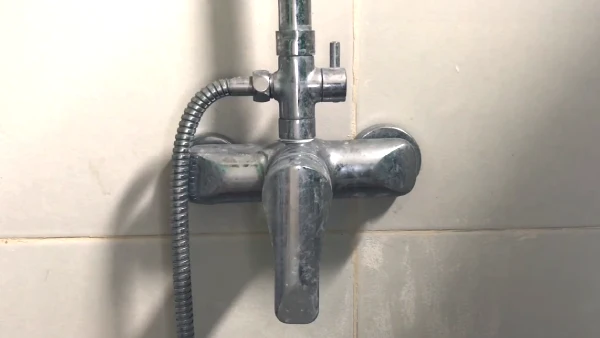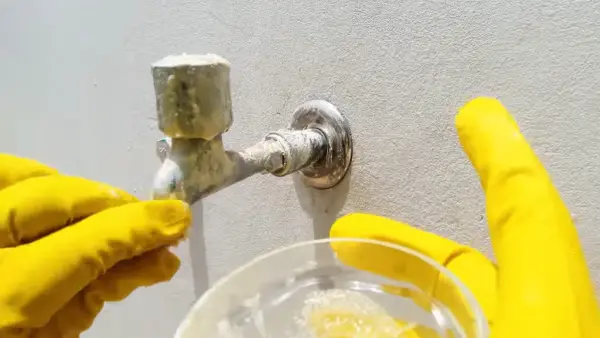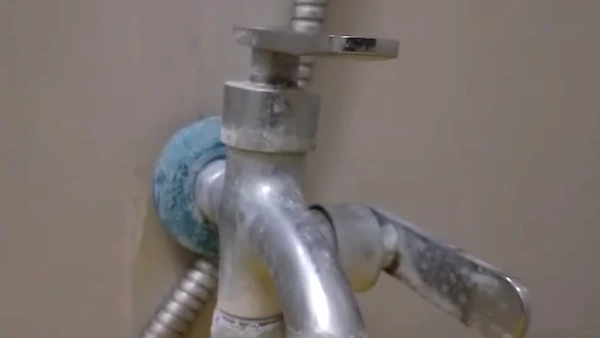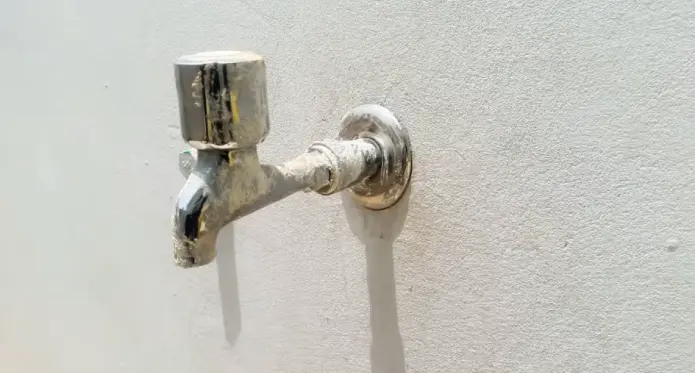Last Updated on November 14, 2023
A white or blue-green film on your bathroom fixtures is an unwanted sight, indicating a sign of corrosion or rust. Not only is this unsightly, but it also indicates your fixtures are being damaged.
Hard water contains high levels of minerals like calcium & magnesium and can build up on the surface of bathroom fixtures, causing rust. Cleaning bathroom fixtures with harsh chemical cleaners can damage the protective finish, exposing the metal to corrosion.
With the help of this article, we’ll explore all the causes of rust on bathroom fixtures and share effective solutions to remove it. So continue reading to get a rust-free bathroom fixture.
What Causes Rust on Bathroom Fixtures: Possible Causes

Rust is typically caused by a combination of factors, such as:
- Standing hard water
- Exposure to excessive moisture
- Use of scourers and abrasive cloths
- Harsh cleaners
- Low-quality fixtures or finish
- Proximity to saltwater
- Infrequent cleaning
1. Standing Hard Water
If you’ve hard water, its minerals can accumulate on your bathroom fixtures, leading to corrosion and a white or blue-green film. Hard water consists of high levels of minerals, such as calcium and magnesium. These minerals can build up over time on the surface of your fixtures, causing corrosion.
The most common sign of corrosion is the formation of a white or blue-green film on the metal. If you notice this film on your bathroom fixtures, it indicates that you’ve had hard water and should take steps to address the issue.
2. Exposure to Excessive Moisture
Excessive moisture in your bathroom can lead to the deterioration of metal surfaces and the formation of rust. When water or moisture comes into contact with metal fixtures, such as faucets, showerheads, or towel bars, rust develops.
This is because moisture contains oxygen and other minerals that can react with the metal, causing it to become oxidized and form rust. The constant exposure to moisture, especially in a bathroom with high humidity levels, accelerates this process.
Rust not only affects the appearance of your fixtures but also compromises their structural integrity. Over time, it can lead to leaks, corrosion, and even complete failure of the metal components.
3. Use of Scourers and Abrasive Cloths
Using scourers or abrasive cloths on metal surfaces can result in scratches that may eventually develop into rust spots. When you use these abrasive cleaning tools, they can remove the protective coating on the fixtures, leaving the metal vulnerable to corrosion.
The scratches act as entry points for moisture and oxygen, which are essential for the formation of rust. Even small scratches or chips in the finish can expose the underlying metal to water and oxygen, initiating corrosion.
4. Harsh Cleaners
Be cautious when cleaning your bathroom fixtures, as harsh cleaners can strip away the protective finish and expose the metal to corrosion. These cleaners contain chemicals that can erode the protective coating, leaving the metal vulnerable to rust.
These cleaners’ strong acidic or alkaline nature can react with the metal surface, causing it to corrode over time. Also, the abrasive nature of these cleaners can scratch the surface of the fixture, creating small grooves where moisture can accumulate and accelerate the corrosion process.
5. Low-Quality Fixtures or Finish
If you choose lower-quality fixtures, you may notice that the thin finish is more prone to damage, exposing the underlying metal and increasing the risk of rust.
These fixtures often have thin coatings that aren’t as durable as higher-quality options. As a result, they’re more susceptible to damage from daily wear and tear, such as scratches or impacts.
6. Proximity to Saltwater
Living near the beach or coastal area can impact your bathroom fixtures. The salt in the air, which is highly corrosive, can expedite the rusting process. When salt mist carried by sea breezes settles on your bathroom fixtures, it can lead to corrosion over time.
7. Infrequent Cleaning
Not cleaning your bathroom fixtures regularly allows dirt, soap scum, and hard water deposits to accumulate, leading to potential damage and rusting over time. When these deposits are left unattended, they can create a breeding ground for bacteria and mold, further deteriorating the fixtures.
The accumulation of dirt and soap scum can make the fixtures look dull and unattractive. Also, the mineral deposits from hard water can corrode the metal surface of the fixtures, causing them to rust.
How to Remove Rust and Stains from Bathroom Fixtures?

To remove rust from bathroom fixtures, ensure your safety with protective gloves and goggles.
Materials You’ll Need:
- White vinegar
- Baking soda
- Soft cloth or sponge
- Toothbrush or soft-bristle brush
- Rust remover product (optional)
- Rubber gloves (for safety)
Step 1: Safety First
Safety is always the first priority when working with bathroom fixtures. Wear rubber gloves to protect your hands from any chemicals you might use.
Step 2: Basic Cleaning with White Vinegar
To clean the loosened rusted area, soak a soft cloth or sponge in white vinegar and let it sit for 15-30 minutes. White vinegar effectively removes rust because it contains acetic acid, which helps dissolve the rust particles. The acetic acid reacts with the iron oxide, breaking it down and making it easier to remove.
As the cloth or sponge sits on the rusted area, the vinegar penetrates the rust and loosens its grip on the surface. After the designated time, gently scrub the rusted area with a cloth or sponge to remove any remaining rust.
Step 3: Baking Soda Paste for Stubborn Rust
If the rust persists, mix baking soda with a few drops of water to create a paste and apply it to the rusted area. Baking soda, also known as sodium bicarbonate, is an effective cleaner and mild abrasive that can help remove stubborn rust stains from bathroom fixtures.
When mixed with water, it forms a paste that can be easily applied to the affected area. The alkaline nature of baking soda helps to break down the rust and loosen it from the surface.
Letting the paste sit for 15-30 minutes gives the baking soda enough time to penetrate the rust and work its magic. Afterward, you can use a soft-bristle brush or an old toothbrush to scrub away the rust.
Step 4: Thoroughly Rinse the Fixtures
Now, it’s time to thoroughly rinse the fixtures with water to remove all residue from the cleaning agents. To begin, turn on the faucet connected with a hose and let the water flow over the fixtures. Direct the water to all the areas where the cleaning agents were applied.
Use your hand or a soft cloth to rub the fixtures while rinsing gently, ensuring all the residue is washed away. Pay close attention to any crevices or hard-to-reach areas as they accumulate residue. Continue rinsing until the water runs clear and no cleaning agent is left on the fixtures.
How do I keep my bathroom fixtures from rusting?

Keeping your bathroom fixtures from rusting is crucial in maintaining your bathroom’s overall appearance and functionality. Wiping your fixtures down after every use can help eliminate any excess moisture that may lead to rusting over time.
Also, implementing a regular cleaning schedule for all your plumbing fixtures can ensure they’re always in top condition.
Prevent Rust on Bathroom Fixtures: Steps To Make Your Fixtures Last
Rust on bathroom fixtures is a common and frustrating problem, but it doesn’t have to be. Understanding the various factors contributing to rust formation and taking preventive measures will make your fixtures look great for a long time.
Regular cleaning and maintenance can help remove rust and prevent further corrosion. Protective measures such as sealing or coating the fixtures can provide an effective barrier against moisture and oxidation.
Keep your bathroom fixtures free of rust’s unsightly effects and ensure their longevity by taking preventative measures.

